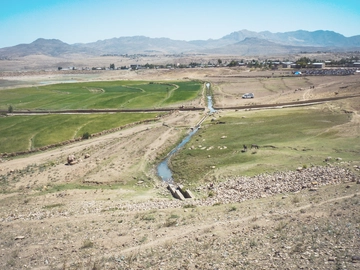Water and energy security for Africa
September 14, 2023.
As part of the BMBF-funded WESA project (2016-2021), ZEF has been working with partners such as the Pan African University Insitute for Water and Energy Sciences (PAUWES) in Niger and with the University of Tlemcen in Algeria. ZEF’s task was to provide strong support for PhD research, especially on topics related to water within the water, energy, food, and climate nexus. In this context ZEF has provided support for two PhD students, Sadame Mohammed Yimer from Ethiopia and Bougara Hanane from Algeria, who have both been working on water resources management.
Both doctoral theses were completed successfully, and both students have received their doctoral degrees, Sadame Mohammed Yimer, on April 3, 2023 and Bougara Hanane on June 23, 2022, from the Faculty of Technology, University of Tlemcen, Algeria, Department of Hydraulics, specialty in Water Resources Management.
Sadame Mohammed Yimer’s wrote his doctoral thesis on 'Modelling the impacts of land use/land cover changes, climate changes and hydropower reservoirs on hydrological responses and sediment load in the Upper Tekeze-Atbarah, Eastern Nile river basin, Ethiopia'.
For his doctoral thesis, Sadame Mohammed assessed the impacts of land use and climate change, as well as of hydro-power reservoirs, on water resources and sediment load in the Eastern Nile river basin. A climate model ensemble for future climate projection was formed. We found that random forest was found to be the most accurate classification technique among other machine-learning algorithms for land-use classification. The study highlights the need for sustainable land-use policies and careful model selection for climate projections. A calibrated and validated Soil and Water Assessment Tool (SWAT) model assessed the impacts of Land Use Land Cover (LULC) and climate on hydrological response and sediment load. LULC changes, climate changes and hydropower reservoirs are influential factors in water-resources availability and sediment load. A new dynamic hydropower reservoir operation method was proposed, which showed promising results in simulating water levels and reducing sediment load downstream.
Bougara Hanane conducted his doctoral research on 'Hydrological modeling in the Tafna Basin in north-west Algeria'.
Bougara Hanane analyzed the hydrological response to climate variability in five Tafna sub-basins in northwestern Algeria. Objectives included selecting climate types, simulating hydrological behavior under different conditions, and comparing results. Homogeneity testing and evaluation of drought indices concluded that wet periods were in the early 2000s and dry periods were between 1990 and 1999. The two lumped models (called GR4J and HBV light) that were applied showed good performance for two calibration periods and provided insight into factors affecting hydrological processes and model structure. The hydrological
response to rainfall time-series variations was inconsistent due to groundwater storage and infiltration. The models were found to be useful tools for predicting water availability under different climatic conditions in similar areas.
More info on the WESA-project here.
Authors: Navneet Kumar and Bernhard Tischbein are senior researchers at ZEF.
Contact: nkumar@uni-bonn.de; tischbein@uni-bonn.de
This article was published in ZEF News No. 47.


